
Photo: Celal Güne/Anadolu/Getty Images
Senate Democrats are filibustering a Republican measure to reopen the federal government. As the shutdown approached and reached record length, Donald Trump grew impatient at the stalemate and demanded that Senate Republicans “nuke” the filibuster altogether and reopen government on a simple majority vote. So far, Senate Majority Leader John Thune has demurred, arguing the votes (presumably Republican votes) aren’t there to take away the Senate minority’s weapon of last resort. It appears Thune & Co. figure Trump will calm down and help broker a deal with Democrats to reopen the government instead of taking a step that might reduce GOP leverage in a future Democratic-controlled Senate.
The Atlantic’s Jonathan Chait isn’t the only pundit who recalls how recently the shoe was on the other foot with Democrats raging against Republican filibusters opposing voting-rights and abortion-rights bills. But Chait is going public in half-seriously, half-mischievously suggesting that the Democrats not only abandon their filibuster but lend Trump a hand in nuking it for good:
Republicans are never going to support eliminating the filibuster when Democrats control the Senate. The only chance to get bipartisan support for a rule change is when a president who holds the party in his cultlike sway has decided to eliminate it. Democrats should take the opportunity to make the Senate simultaneously more democratic and more faithful to the Founders’ vision.
After years of slow progress toward filibuster reform, nearly all Senate Democrats were committed to get rid of it in 2021 and were stopped by two holdouts who are no longer around (Joe Manchin and Kyrsten Sinema). But to get technical about it, most Democrats were not trying to kill the filibuster altogether (the so-called nuclear option) but to create new “carve-outs” from the right to filibuster for legislation confirming fundamental rights like the right to vote and the right to have an abortion. Presumably in the present emergency the Senate could “carve out” exceptions for spending bills as well, but that might be a loophole large enough to swallow the filibuster altogether given the ability to do all sorts of things by funding or defunding this or that. But Chait seems to believe just getting rid of the much-abused dilatory tactic is something Democrats should favor as a matter of principle and long-range strategy:
Support for the filibuster used to be thoroughly bipartisan. In recent years, Democrats have mostly abandoned it, even as it retains its Republican backing. The reason for this is simple: Republicans have fewer ambitions for government, and most of the things they want the Senate to do—confirm judges and appointees; cut taxes and spending—can already be done with 51 votes.
[O]ver the long run, the filibuster does more to impair Democrats, the party of expansive government, than Republicans.
Chait also effectively dismisses the claim that the filibuster makes bipartisanship necessary with the current poisonous atmosphere of partisan polarization in and beyond Congress supplying all the evidence necessary.
But is the current emergency perhaps the exception that proves the rule? Democrats have deployed the filibuster to shut down the government precisely because it’s the only source of leverage they have in a Republican-controlled Congress that has surrendered all power to a rapacious executive branch. Without the filibuster, congressional Democrats would be largely reduced to flailing rhetorically and failing repeatedly to take steps to “stop Trump” as their party activists have demanded. We’ll soon see how it all turns out, but the counter-argument is that Democrats have taken a hostage that’s more dear to them than to the government-hating party that is so far refusing to cut any deals to reopen government. If Trump won’t exercise his own supposedly superior deal-making power to get the chore done, the gridlock could go on indefinitely. Maybe that will hurt Republicans in next year’s midterm elections more than Democrats, as polls currently suggest, but there would be immense collateral damage.
It’s possible that Democrats secretly hope Republicans will kill the filibuster and reopen government without much help from the minority party and would privately regard the demise of the filibuster as a reward for their perseverance. But it’s unlikely they’ll toss away the weapon they have wielded so fiercely and so recently. The filibuster is likely to stick around for the time being unless Trump really does go medieval on his Senate allies and unleash holy MAGA hell on them for disobeying his wishes. More likely, Democrats will just have the consolation of knowing Republicans think they’ll lose control of the Senate soon enough to need the filibuster for their own purposes.
More on Politics
Should Democrats Help Trump Kill the Filibuster?Stefanik’s Campaign Launch Is Much About MamdaniGet Ready for an Air-Travel Meltdown
From Intelligencer - Daily News, Politics, Business, and Tech via this RSS feed

